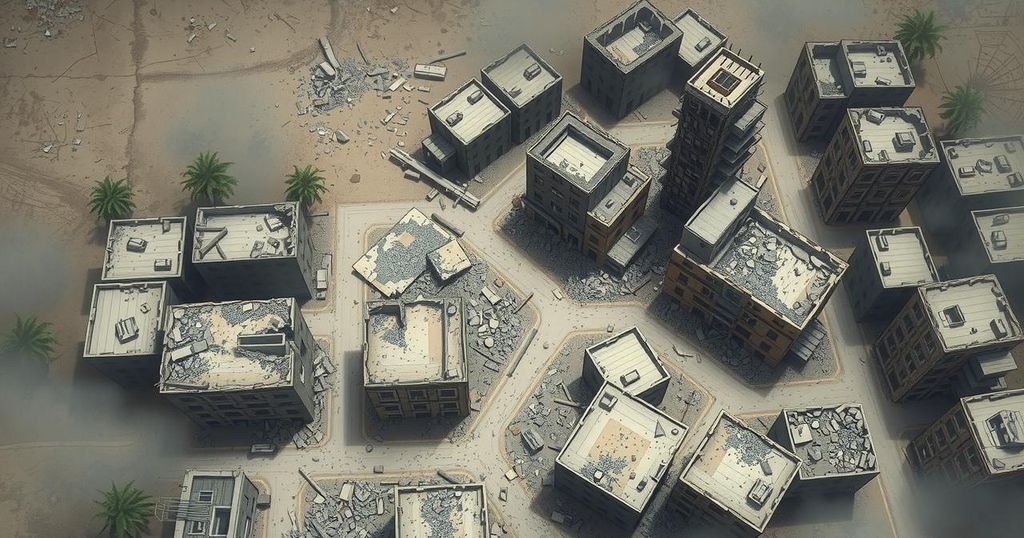Trump Proposes Gaza ‘Freedom Zone’ Amid Humanitarian Crisis, Ceasefire Talks Stall
President Trump proposed a “freedom zone” for Gaza amid escalating violence and rising casualties due to Israeli airstrikes. His remarks came during a trip to the Middle East, while ceasefire talks falter. The situation in Gaza worsens as negotiations yield little progress, raising concerns over the humanitarian crisis and the fate of displaced Palestinians.
In a recent visit to the Middle East, President Trump proposed transforming the Gaza Strip into a “freedom zone,” amidst escalating violence in the region. His remarks coincided with intensified Israeli airstrikes that have resulted in over 150 deaths, including many children, in just the past day. Critics and Arab nations have vehemently opposed Trump’s plan, viewing it as a means to forcibly displace Palestinians from their homeland.
Trump’s controversial trip did not include a stop in Israel, although he did address reporters in Qatar following a business roundtable. “Gaza has been a territory of death and destruction for many years,” he asserted, suggesting that U.S. involvement could help establish this new zone despite widespread international condemnation. The Israeli government has shown support for Trump’s vision, which many critics label as ethnic cleansing.
The grim situation in Gaza has worsened, with recent reports indicating that the death toll from Israeli assaults has risen above 53,000, a shocking one-third of whom are children, according to local health officials. These developments cast a long shadow over the broader push for a ceasefire, as fighting continues unabated.
Just prior to Trump’s Middle East engagement, Hamas released Edan Alexander, an Israeli soldier captured during the October 7, 2023 attack. The release was hailed as a potential breakthrough for U.S.-mediated ceasefire discussions. However, despite initial hopes from the release, subsequent negotiations appear stalled, with no substantial progress reported.
Hamas had stated they agreed to Alexander’s release in exchange for humanitarian aid entering Gaza, asserting it indicated a shift towards discussions for permanent ceasefire terms. Still, Israeli Prime Minister Benjamin Netanyahu has pushed for a limited truce, insisting upon the necessity of defeating Hamas before any lasting peace can be achieved.
Amidst these tensions, Trump has also been engaged in high-stakes financial negotiations with Gulf states. The finalized agreements included a substantial order from Qatar for Boeing aircraft and investments in technology and defense sectors during stops in Saudi Arabia. However, his rhetoric has drawn further concerns, particularly with statements that seem to dismiss the political implications of military engagement.
At a rally-style event with U.S. troops at Al-Udeid Air Base, Trump made contentious comments about the past presidential election, dismissing the Biden administration and calling for a return to his previous policies. He praised the soldiers while coupling his remarks with campaign-style slogans, suggesting a focus on military readiness and strategic dominance in the region.
The complexity of the ongoing violence and humanitarian crisis in Gaza is being overshadowed by talk of geopolitical strategy and investment deals. Critics argue that these discussions must incorporate urgent humanitarian solutions to prevent further suffering in the already beleaguered region.
Overall, Trump’s visit underscores a multifaceted approach to Middle Eastern affairs, intertwining investments with military strategy — yet the pressing humanitarian crisis in Gaza calls for immediate global attention and action.
President Trump’s proposal for a “freedom zone” in Gaza comes at a time of devastating violence and suffering. As ceasefire talks falter, the humanitarian crisis deepens with tens of thousands of Palestinian casualties reported. Meanwhile, Trump’s focus on strategic deals in the Gulf highlights a complicated intertwining of military and economic interests. It remains imperative for international actors to address the urgent humanitarian needs exacerbated by ongoing conflicts and blockades in the region.
Original Source: health.wusf.usf.edu




Post Comment